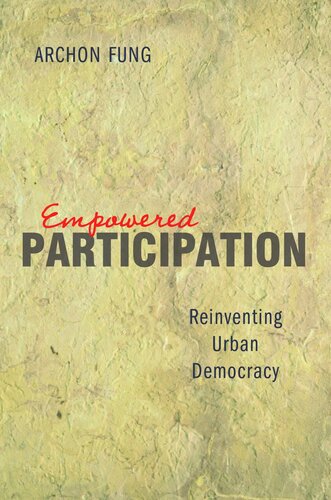

Most ebook files are in PDF format, so you can easily read them using various software such as Foxit Reader or directly on the Google Chrome browser.
Some ebook files are released by publishers in other formats such as .awz, .mobi, .epub, .fb2, etc. You may need to install specific software to read these formats on mobile/PC, such as Calibre.
Please read the tutorial at this link: https://ebookbell.com/faq
We offer FREE conversion to the popular formats you request; however, this may take some time. Therefore, right after payment, please email us, and we will try to provide the service as quickly as possible.
For some exceptional file formats or broken links (if any), please refrain from opening any disputes. Instead, email us first, and we will try to assist within a maximum of 6 hours.
EbookBell Team

4.7
86 reviewsEvery month in every neighborhood in Chicago, residents, teachers, school principals, and police officers gather to deliberate about how to improve their schools and make their streets safer. Residents of poor neighborhoods participate as much or more as those from wealthy ones. All voices are heard. Since the meetings began more than a dozen years ago, they have led not only to safer streets but also to surprising improvements in the city's schools. Chicago's police department and school system have become democratic urban institutions unlike any others in America.
Empowered Participation is the compelling chronicle of this unprecedented transformation. It is the first comprehensive empirical analysis of the ways in which participatory democracy can be used to effect social change. Using city-wide data and six neighborhood case studies, the book explores how determined Chicago residents, police officers, teachers, and community groups worked to banish crime and transform a failing city school system into a model for educational reform. The author's conclusion: Properly designed and implemented institutions of participatory democratic governance can spark citizen involvement that in turn generates innovative problem-solving and public action. Their participation makes organizations more fair and effective.
Though the book focuses on Chicago's municipal agencies, its lessons are applicable to many American cities. Its findings will prove useful not only in the fields of education and law enforcement, but also to sectors as diverse as environmental regulation, social service provision, and workforce development.